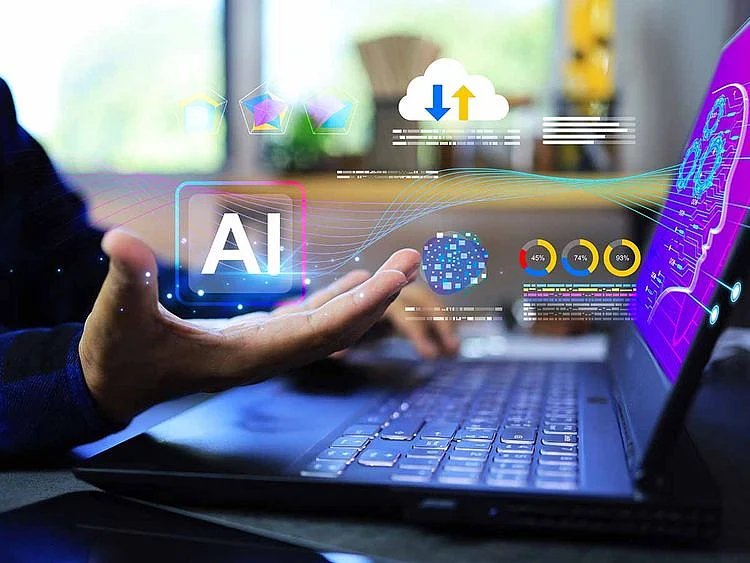In today’s fast-paced world, AI has become a significant part of our daily lives, revolutionising how we accomplish tasks, interact with technology, and even access health care.
From streamlining daily activities to enhancing education, the impact of AI is undeniable. Its transformative power is evident in areas such as transportation, education, and productivity, but the rapid integration of AI into our decision-making procedures also raises concerns about overdependence and ethical challenges.
Transformative impact of AI
We use AI in our daily lives as it has brought unparalleled efficiency and convenience. For example, we utilise it in our households, as smart devices automate tasks, from energy management to voice-assisted routines, saving time and resources. In workplaces, AI-driven systems automate repetitive tasks, freeing up human workers for creative and strategic responsibilities.
In health care, AI has revolutionised diagnostics, enabling earlier detection of diseases and personalised treatment plans. Telemedicine powered by AI breaks geographical barriers, delivering quality care to underserved areas. Similarly, education benefits from AI’s adaptive technologies, which tailor content to individual learning styles and provide real-time feedback. These advancements democratise access to services and improve outcomes across sectors.
However, with these profound benefits come significant risks, particularly as society grows increasingly reliant on AI-driven systems.
Risks of Overdependence
The widespread adoption of AI risks eroding critical human skills. Delegating decision-making to AI in sectors like finance, health care, and governance can lead to diminished critical thinking and accountability. For example, AI tools executing financial trades autonomously may leave users detached from underlying strategies, creating blind trust in technology.
Additionally, AI systems often require vast amounts of data, raising privacy concerns. Smart home devices and health care applications collect sensitive information, which, if mishandled, could lead to breaches or misuse. This vulnerability is compounded by the lack of transparency in AI algorithms, making it difficult to understand how decisions are made or biases perpetuated.
The economic impact of AI is another pressing concern. Automation displaces traditional jobs, particularly in manufacturing and service industries, contributing to unemployment and economic inequality. Without proactive efforts to reskill and upskill the workforce, the rapid pace of AI adoption may leave many workers unprepared for the demands of an AI-driven economy.
Overreliance on AI can lead to blind trust and significant risks across various sectors. In health care, financial systems, and autonomous vehicles, errors or biases in AI algorithms can result in misdiagnoses, financial losses, and accidents without adequate human oversight. Privacy concerns arise as smart devices collect sensitive data, creating vulnerabilities to breaches and misuse.
AI-driven recruitment and social media moderation can perpetuate biases and censor legitimate content. In critical infrastructure and politics, overdependence on AI risks system failures and manipulation of public opinion. These examples highlight the need for balanced AI use, prioritising human Judgment to mitigate potential harms.
Moreover, AI could negatively impact us by causing a loss of our human touch and originality. While AI offers numerous benefits and represents the future, we must not forget what life was like before its advent. It is essential to stay connected to our humanity and maintain our sense of authenticity.
Need for Regulation and Oversight
Regulating AI is critical to mitigating these risks. Governments, developers, and users must collaborate to create ethical guidelines and policies that govern AI’s use. These frameworks should prioritise transparency, accountability, and fairness, ensuring that AI systems are explainable and do not perpetuate discrimination or inequality.
Data protection laws must be robust, safeguarding individual privacy and preventing unauthorised use of sensitive information. Policymakers should also establish standards for testing AI systems, particularly in high-stakes areas like health care and finance, where errors can have profound consequences.
Human oversight remains essential in AI deployment. While AI can expand human capabilities, it must not replace the nuanced Judgment and empathy that only humans can provide. In fields like mental health care, AI tools should complement, not substitute, human therapists, ensuring ethical and effective outcomes.
Way Forward
AI is undeniably a transformative force, offering unprecedented opportunities to improve lives and drive progress. However, overreliance on AI without adequate regulation poses significant risks, from eroding human skills and privacy to disrupting economies. By prioritising ethical development, human oversight, and robust policies, we can harness AI’s potential as a tool for enhancement rather than dependence.
Striking this balance ensures that AI serves humanity, fostering a future where technology and society thrive together.
Najla Al Midfa is a researcher at TRENDS Research and Advisory
Sign up for the Daily Briefing
Get the latest news and updates straight to your inbox
Network Links
GN StoreDownload our app
© Al Nisr Publishing LLC 2026. All rights reserved.
